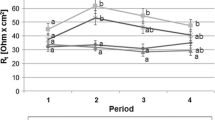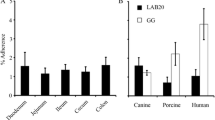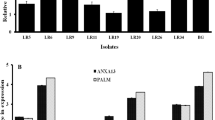Abstract
Enteral probiotics such as Lactobacillus casei GG (LGG) have been used in the treatment of a variety of intestinal disorders in infants and children, including diarrhea, malabsorption, and Clostridium difficile colitis. We have previously demonstrated that the probiotic bacterium LGG has an inhibitory effect on bacterial translocation (BT) in a neonatal rabbit model. However, this in-vivo model is limited for investigating the cellular and molecular mechanisms responsible for probiotic inhibition of BT. The purpose of this study was to determine the efficacy of LGG in reducing the rate of Escherichia coliC25 (E. coli C25) translocation using an in-vitro enterocyte cell-culture model. Human colonic carcinoma (Caco-2) enterocytes were seeded in porous filters in the apical chamber of a two-chamber cell- culture system and grown for 14 days to confluence. The monolayers were incubated at 37 °C with LGG for 180 min. Non-adherent LGG was washed away prior to a 120-min incubation period with 105 CFU E. coli C25. E. coli that had translocated across the enterocyte monolayer were quantified by growing basal-chamber media samples on gram-negative bacteria-specific MacConkey's agar. In order to determine monolayer integrity, transepithelial electrical resistance (TEER) was measured across Caco-2 cells treated with LGG and E. coli. Statistical analysis was by ANOVA with P < 0.05 considered significant. LGG inhibited E. coli translocation at all LGG concentrations tested. The TEER ratio was not significantly altered by addition of LGG or E. coli (0.9 ± 0.03 vs 0.8 ± 0.05). These results demonstrate that the probiotic bacterium LGG inhibits BT of E. coli C25 in a dose-dependent manner in an in-vitro cell-culture model. This model should be valuable in investigating the cellular and molecular mechanisms involved in the inhibition of pathological enteral bacteria by probiotic agents.
Similar content being viewed by others
Author information
Authors and Affiliations
Rights and permissions
About this article
Cite this article
Mattar, A., Drongowski, R., Coran, A. et al. Effect of probiotics on enterocyte bacterial translocation in vitro. Pediatr Surg Int 17, 265–268 (2001). https://doi.org/10.1007/s003830100591
Issue Date:
DOI: https://doi.org/10.1007/s003830100591




